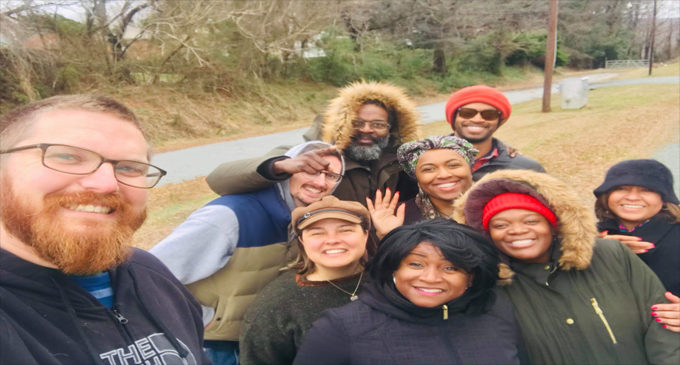CSEM-supported group underscores new mode of community mobilization
Michael Banner (left) and Marcus Hill (right, in back of photo), with Island CultureZ participants at a discussion on organic land management protocol in 2018.

By John Railey
Michael Banner and Marcus Hill have been chipping away at food insecurity in East Winston, forming a nonprofit, Island CultureZ, to increase land and market access for economically marginalized communities, focusing on urban gardens, more accessible farmers’ markets and other strategies. It is sorely needed work in East Winston, which has a high number of food deserts.
Recently, Island CultureZ secured a $25,000 transportation grant from The Winston-Salem Foundation, a grant that affirms a new form of community mobilization. With the grant, the nonprofit will buy buses to provide transportation for youth to work at urban and rural farms. It’s timely for Island CultureZ and for another of its supporters, Winston-Salem State University’s Center for the Study of Economic Mobility (CSEM), whose research has helped drive public dialogue and action on public transportation, including by being a major factor in The Winston-Salem Foundation’s decision to establish the transportation grants. Another grant in the program went to Forsyth Technical Community College, which contracted with CSEM to do a groundbreaking study on challenges its bus-riding students face and ways to resolve those challenges.
Transportation problems figure heavily in equities in education, just as they do in inequities in food access, employment and health care – all of which are barriers to upward economic mobility. CSEM aims to break down those barriers through research and engagement across communities, especially those of low-resources.
The foundation noted that Island CultureZ’s “approach is strategic in proposing something that can be grown from a grassroots perspective and organically over time.”
Banner, the executive director of Island CultureZ, and Hill, the chairman of the board, like the fact that the foundation established a group of residents to allocate the transportation grants. “This is very much a community-grown solution to a long-standing community issue,” Hill said. “Community-grown to the extent that funding for it came from a very under-utilized participatory grantmaking process. This is worth noting because as much as our local philanthropic institutions talk about equity, few are employing the infrastructure necessary to achieve it.”
Banner said: “No man nor woman is an island to themselves, although it can get awfully lonely trying to carve out an existence with grassroots agriculture in the ruddy red clay landscape of Winston-Salem. With these buses, we are going to at last galvanize the movement so that we can employ camaraderie and popular education as we go about the business of re-branding ‘urban farming’ in Winston-Salem so that it better reflects our call for land reclamation and cooperative economics in building community resilience … Ours is really an organization that organically grew out of the food disparity in East Winston.”
Hill said: “For this grant, one aim was to create a solution for moving food, farmers, and even volunteers around a growing network of urban farms to increase access to land, market, and even agritourism opportunities. As much research has shown, transportation hardship is significant in Winston-Salem. And it doesn’t only affect people, but the movement of goods, services, and other resources, as well as the ability to generate and meet demand. It directly affects our local economy and ultimately even our culture in that our foodways aren’t nearly as robust as they once were back when Winston-Salem had a thriving Black economy (pre-Highway 52 and other disastrous land use and urban planning policies (very non-participatory decisions certainly)).
Alvin Atkinson, CSEM’s associate director, serves on the board of Neighbors for Better Neighborhoods with Banner, and heard about Island CultureZ from him. After Atkinson learned more about Banner and the group’s purpose, Banner was named a Community Scholar, and the group received an Economic Mobility Award. This recognition and financial award aim to accelerate the building of pathways to economic mobility in areas including health and well-being, of which Island CultureZ is an excellent representation, Atkinson said.
The nonprofit also fits CSEM’s goal of getting more WSSU students involved in economic mobility. It is planning an agricultural education program for students, who can intern with Island CultureZ.
Hill said: “One important dimension to our ‘food and farmer’ transportation program is that it’s an effort to be proactive as we continue to develop other facets of our vibrant, equitable, and decolonized local food system rooted in solidarity and cooperative economics via the dynamic and necessarily multi-dimensional work of Island CultureZ. This is to say that the transportation front complements our efforts toward land-, market-, and cooperative enterprise access to hopefully help usher in a viable local food economy for our neighbors.”
CSEM and many community partners are encouraging such efforts, ushering in a new mode of community mobility.
John Railey, raileyjb@gmail.com, is the writer-in-residence for CSEM, www.wssu.edu/csem.











